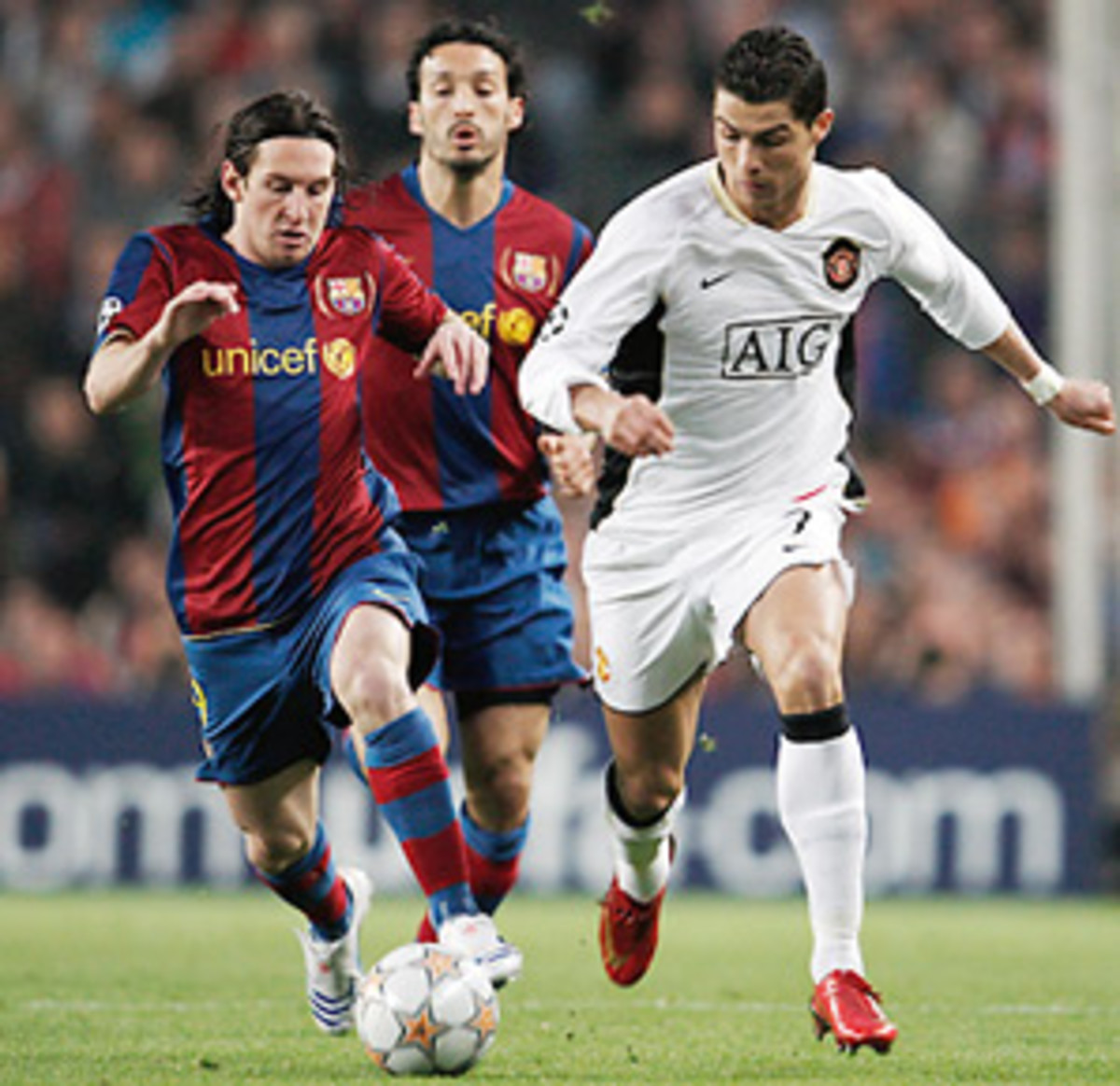Good As It Gets
One is the kind of athlete you might design in a lab: tall, lean and muscular, with a seemingly inexhaustible arsenal of skills. The other is a throwback, a scrappy little player whose abilities are more difficult to pin down because they border on the metaphysical. At 6'1" and 172 pounds, Manchester United's Cristiano Ronaldo is soccer's Magic Johnson: a big man with skills usually associated with smaller players. At 5'7" and 148 pounds, Barcelona's LionelMessi looks more like somebody's kid brother and plays like Pete Maravich, with an otherworldly touch that allows him to do the unthinkable with the ball.
On May 27, when United meets Barça for the UEFA Champions League trophy, the 67,000 fans packed into Rome's Olympic Stadium and the estimated 200 million watching the global telecast will be treated to a match made in footballing heaven. For the first time ever in a Champions League final, the two best players on the planet will face off against each other. Last year Ronaldo and Messi finished one-two in the voting for FIFA World Player of the Year and the Ballon d'Or, soccer's most coveted MVP awards. This year they are very likely to go one-two again, probably in reverse order.
The final of this season's 10-month European club tournament is a clash not only between Ronaldo and Messi but also between two of the world's most popular and storied teams, not to mention the champions of the two best domestic leagues, England's Premiership and Spain's La Liga. Not since 1994, when Barcelona met AC Milan for the world's most prestigious club trophy, has the final pitted the current season's winners from England, Spain or Italy, the world's top leagues.
Both Ronaldo and Messi are wingers who invariably drift inside to take over games, and both can be breathtaking to watch. That, though, is where their similarities end. In most respects the pair are a study in contrasts, embodying the truism that soccer is a game for all shapes and sizes.
YouTube overflows with fan-made compilations of classic Ronaldo goals, and because he scores in so many different ways, it's difficult to single out one shot. Yet if there is a common theme to his goals, it's the purity with which he strikes the ball. Whether he's bringing a dead ball to life (as he did with a swerving, dipping free kick against Arsenal in the second leg of the Champions League semifinals on May 5) or accelerating, turning a defender inside out and smacking the ball just inside the far post (as he did against Dynamo Kyiv last season), the Portuguese superstar's goals are ballistic marvels.
"Ronaldo is the complete footballer," says Avram Grant, the former Chelsea manager whose team lost to United on penalty kicks in last year's Champions League final in Moscow. "He's quick, he's strong, he can hit a free kick, he strikes the ball equally well with either foot, he's creative, and he's an outstanding header of the ball. In terms of ability, he doesn't have a weakness in his game."
The quintessential Messi masterpiece came in 2007 against the Spanish club Getafe: Starting in his own half, he embarked on a dizzying slalom to beat five defenders and the goalkeeper, all the while keeping the ball within a few inches of his tiny feet, as if on a leash. Often the mere threat of what the swift Argentine might do is as influential as what he actually does: Witness Barcelona's dramatic stoppage-time equalizer against Chelsea in the semifinal second leg on May 6, when Messi received the ball in the box, sucked three opponents toward him and then dumped it to an unmarked Andrés Iniesta, whose goal sent Barça to this year's final.
"Messi may be as quick over five yards [as Ronaldo] but not over longer distances, and his right foot is ordinary," says Grant, "but he has an awareness and an ability in tight spaces which nobody else has. And he has real magic in his left foot."
There is no conventional wisdom on how to stop either player, not least because both can pop up in any area of the pitch, creating mismatches, and each has a stellar cast around him. Those who have contained Ronaldo have often done so by rattling him psychologically, stoking his volatile temper. When Messi has been shut down, it's usually been by quick, physical opponents who aren't afraid to push the boundaries of the rules. Indeed, when United defeated Barça in the Champions League two-leg semifinals last season -- a dour defensive affair in which the Blaugrana failed to score even one goal -- and Chelsea held Barça scoreless in this year's semifinal first leg, the Spanish press bemoaned what it described as the English clubs' "negative tactics."
Whatever the result in Rome next Wednesday, one thing is certain: Since Ronaldo is 24 and Messi just 21, this is only the beginning of a rivalry that will captivate the sports world for the next decade. "Each is the future in his own way," says Grant. "Ronaldo because he foreshadows players who are constantly becoming bigger, more athletic, more skillful. But Messi, too, because as players get bigger, space gets smaller. Anyone can play in [ample] space. Playing when there is no room requires magic, and Messi is magic."






